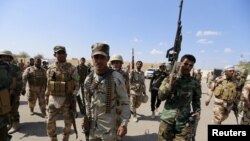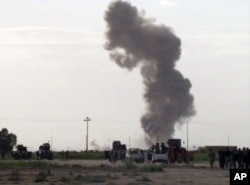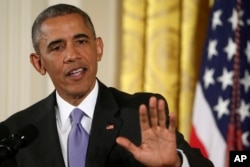World leaders reached a deal with Iran on July 14 to ease economic sanctions if Iran curbs its nuclear capabilities, and this has reopened the debate over whether the U.S. should work more closely with Iranian-backed militias, several dozen of which are now fighting against IS in Iraq.
The Iraqi prime minister has called them the “backbone of the fight against ISIS,” and they have proved to be one of the most effective fighters on the ground.
Shi'ite militias, operating under the collective umbrella of the “Popular Mobilization Forces,” were instrumental in breaking IS’s eight-week siege of the northern town of Amerli in September 2014.
A month later, they helped recapture Jurf Al Sakhar and in November, the oil-refinery town of Beiji.
Most notably, they were key in helping wrestle the city of Tikrit away from IS this past March, a victory considered key to liberating central Anbar province.
But following IS’s retreat from that city, there were troubling accusations of Shi'ite abuses — burning, looting and killing captives. Fearing a return of the sectarian violence that was rampant during the U.S. occupation of Iraq and pressured by Washington, Prime Minister Haider al-Abadi ordered Shiites to withdraw from Tikrit.
“And when the Shiaa militia were pulled back, that’s when we lost Ramadi,” said Max Abrahms, assistant professor of political science at Northeastern University.
Abrahms said he believes that the U.S. should work both with Iran and Syrian president Bashar al-Assad to defeat IS.
“As an American, the question I would ask is ‘Which poses a greater threat to the U.S. homeland?’ And I think it’s clearly it’s the Islamic State.”
It follows, he said, that if the U.S. wants to defeat IS, it has only two choices: Either send troops into Iraq itself, or work with the Shi'ites.
“I think there’s no question that the Shia’a axis between Iran and Syria and Hezbollah has a lot of blood on their hands, but they don’t pose a direct threat to the U.S. homeland in the way that IS does,” Abrahms said.
Abrahms admits that in working with Shi'ite militias, the U.S. would risk of presenting itself as anti-Sunni. To counter this perception, he thinks the Obama administration should make a clear statement to Sunni populations and governments in the region.
“Tell them that our first choice would be to have them take on groups like the Islamic State and al-Qaida,” he said. “But short of that, if they are unwilling to provide boots on the ground, then our support will, instead, have to come from their arch-enemy.”
This might, he said, leverage the Sunni world into getting more involved in battling IS.
Shifted policy?
The U.S. has repeatedly said it will not coordinate any military activities with Iran, and insisted that Shi'ite militias answer only to Baghdad, not Tehran. There are signs, however, the administration may be reconsidering.
In announcing the Iran deal Wednesday, President Obama said he doesn’t foresee restored diplomatic relations with Iran nor any “formal set of agreements” with Iran on how to take on IS.
“But clearly, Iran has influence in Iraq and that some of the country’s actions are helpful,” he said.
This echoes comments he made during an April meeting with Iraqi Prime Minister Haider al-Abadi in Washington, where the president acknowledged that Shi'ite forces may be necessary to winning the fight against IS.
America’s top general appears to concur.
“Frankly, it will only be a problem if it results in sectarianism,” Chairman of the Joint Chiefs of Staff Martin Dempsey told Senate lawmakers in early March. “If they perform in a credible way... then it will, in the main, have been a positive thing in terms of the counter-ISIL campaign.”
But for some parties in the region, the idea is very troubling.
“I’m not sure that the Saudis are necessarily see it that way,” said Fahad Nazer, a terrorism analyst and former political analyst at the Saudi Embassy in Washington.
“While the Saudis and an overwhelming majority of Sunni-majority countries have all condemned ISIS,” he said, “many leaders, as well as Saudi citizens that I come across on social media, are expressing deep concern about alleged atrocities that some of these Shi’a are committing against mostly Sunni areas in Iraq as they are being — quote — liberated from ISIS.”
Nazer believes that if Shiites use the fight against IS as an opportunity to exact revenge on the wider Sunni population, the resulting sectarianism will only work in IS’s favor.
“Put simply, today most Sunnis in Iraq view ISIS as their salvation against the Shi'ites,” said Josef Olmert, adjunct Professor at the University of South Carolina. “If they know that they can get control over part of Iraq, they will have an incentive to reject ISIS.”
Bitter pill
While he realizes the risks, Michael Knights, an Iraq expert and fellow at the Washington Institute for Near East Policy, says that cooperation may be inevitable.
“So far all we've done is uncoordinated deconfliction,” he said, “staying out of each other's ways. I think the U.S. and UK probably have to swallow the bitter pill of working alongside the Shia militant groups like Kataib Hezbollah, who killed so many of us.”
He refers to the Iranian-backed paramilitary group which in 2009 the U.S. designated a Foreign Terrorist Organization for conducting “numerous terrorist acts against Iraqi, American and other targets during the U.S. occupation that ended in 2011.
“But at the same time we can strengthen moderate and rival elements of the Shia power structure in Iraq to ensure that groups like Kataib Hezbollah cannot exploit the war in Iraq to build their own power bases in future elections,” he said.
If the U.S. does decide to coordinate with such groups, the Iraqis will have to serve as the go-between, he said.
“We don't want to talk directly to Karaib Hezbollah — and the feeling is entirely mutual," he added.






